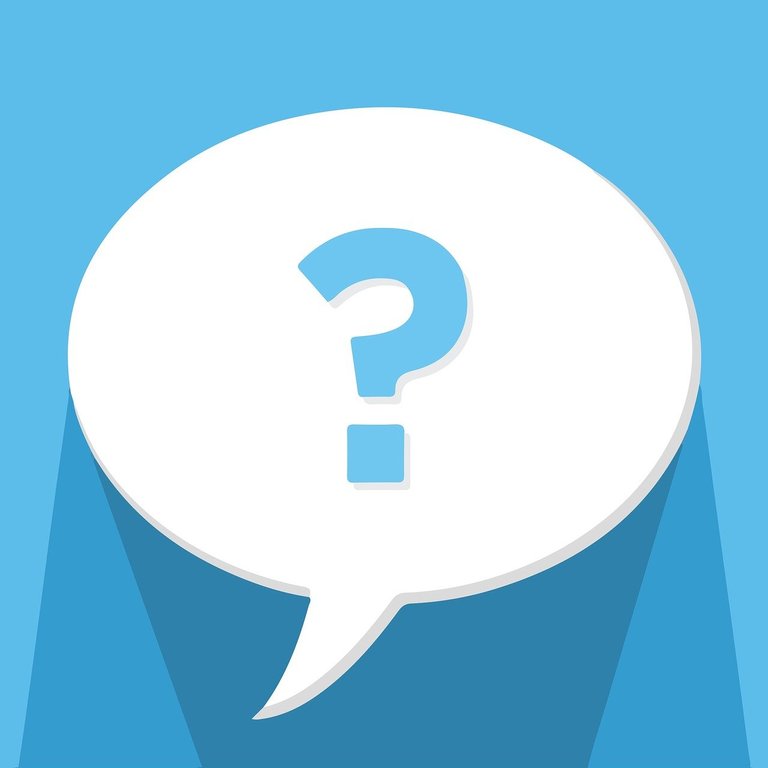
What differentiates a lazy thinker from a deeper thinker? By no means would I call myself a deep thinker, however, I think I have learned a way, quite basic I would say, but no less effective, to go deeper and develop a greater understanding about practically anything. It's pretty basic, as I said, but somehow I find it really worthwhile.
So what differentiates someone with a deep understanding from someone with a more superficial one? Perhaps several things, but I think one of the most important, and the one I will emphasize today, is the ability to question things. What is questioning? As the name implies, it is simply asking questions. It all comes down to the ability to ask questions. Simple. But not for that reason common. Maybe it's some sort of secret hidden in plain sight. I can't stress enough how important this is in my opinion.
If we don't ask questions, at some point most of our knowledge will be reduced to simple repetition of something previously heard. Not all of it. But to a great extent. Because questions are what help us to clarify any doubts, to go around the subject, to embrace it from all sides, and to have a greater understanding of it. We need to ask the how, the why, the what, etc. Just by asking questions, we will know more and understand why it is the way it is.
Ask genuine questions. As many as we can. Even, and especially, if they are "stupid" questions. The "stupid" questions, I believe, are the ones we learn the most from. And really, most of the time they are not stupid at all. The more basic the question we ask, the better our understanding of it.
I will say, you can't imagine how much one can grow as a person simply by asking questions. Not only do you learn so much more, but you also evolve as a person with that learning. It really is amazing.
A list.
I have been learning English for a while, and one thing I noticed is that, no matter how much I studied and studied, I still felt a little insecure about my English. So I decided to do something, I went through my old notebook and went over what I had written down, and every time a doubt came up about something or every time I felt insecure about this or that, I put it down on a piece of paper. I wrote down, basically, everything that I wasn't totally sure about or didn't understand perfectly. It was essentially a list of questions, all kinds of questions related to things that I didn't fully understand. And then, I researched and looked for the answers to all those questions that I was asking myself. The result was that these questions led me to learn and delve much deeper, and my confidence in handling the language went up steeply. Of course, that doesn't mean I'm completely fluent, but it did make me a lot better considering the position I was in.
I realized that by asking all those questions, most of my insecurities and doubts were dispelled. It has been a while and I may not remember the answer to all those questions, but I know that the most important things I can remember and I feel much more confident that I can answer well if I am put to the test.
But if you don't ask the necessary questions, and don't clarify your doubts, you will not be able to pass the first serious test. This is the reason, I think, why most people, if skillfully questioned by an experienced interlocutor about their own beliefs, first doubt, then hesitate, and later contradict themselves, moving from one side to the other without any rest and without finding a solid base from which to support themselves. Even the most apparent and plausible opinions become difficult to sustain if we have not given them enough thought. That is why we need to question things.
I think the technique I used with my English is very effective, and I have thought about using it on other topics. Although it is not entirely necessary as long as one keeps actively asking the right questions. But I think it is valid, and one can use it on virtually any subject. One will know and feel differently.

Conversations.
I like books, they are usually a somewhat reliable source of knowledge and you can enjoy reading them. However, there's a problem, you can't ask books questions, they won't answer you. If you have trouble understanding a book, you have to turn to something else, maybe another book or a person, or something like that. I'm not criticizing them, I'll still continue to read them. But that's a point.
Now, there is also a very useful source of knowledge that we often overlook: conversations. Think about this, if you had the choice between being able to read a book or being able to have a conversation with its author, which would be more convenient? You could ask him every question, address every issue, and find out everything he has to say about it.
In fact, books are not very different from conversations, only that they are one-sided conversations, in which only one speaks. Of course, they have their differences too, and each has its advantages. But sometimes I think that I could learn more about certain subjects if I could talk to someone who knows about it and ask him all kinds of questions that come to my mind. From the most fundamental to the most complex.
You can learn on your own, and that's great, but sometimes I think we overlook the power of actually talking to other people. As well as asking questions, I believe that one can also evolve a lot as a person by having conversations. It seems too simple to be true, but I think there are certain types of conversations where you learn just too much. In which you can cover topics from different angles and deal with the subject matter in depth. I truly believe that, just as books are a great source of knowledge and help us in general to learn and evolve, conversations have the same power and I would say even more.
The influence a person can have on your life simply by conversing should not be underestimated. Sometimes simply being around capable or intelligent, or talented, knowledgeable people, and conversing with them, can make you grow and evolve. You can learn a lot from the knowledge and wisdom these people have accumulated. Conversation can have the same effect (or even greater) than a book in this sense. You just have to know how to do it. And know how to ask questions, of course.
I think that sums up my point well about why it's good to master skillful conversation and develop the habit of asking questions.
Thanks for sharing. i may use this to help me learn Bulgarian.
Feel free to ask me question about preventing/reversing virtually any dis-ease,
and/or about how we can "save the world" by using a particular system of decentralised community governance.
Sat Nam
Thanks. I will keep it in mind. Maybe in the future.
In fact I was going to write something the other day about decentralization. There is a Romanian scientist who talked about nature somehow proving the efficiency of decentralization. But I can't remember who he was.
Thanks again for your time, the sharing, and also kindly thanks for the mention.
Cheers!